PM pays tribute to 'inspiring' civil rights leader
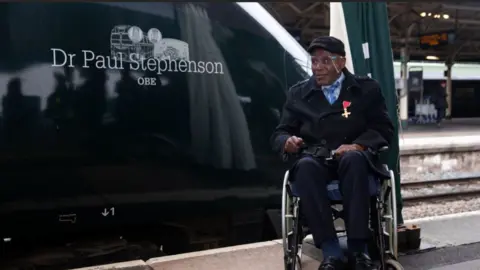 BBC
BBCPrime Minister Sir Keir Starmer has paid tribute to an "inspiring" civil rights campaigner, who paved the way for the first Race Relations Act.
Dr Paul Stephenson OBE, 87, organised the 1963 Bristol bus boycott, which overturned a ban on people from ethnic minorities working on buses in the city.
In a statement, his family said he passed away on Saturday evening after a "courageous battle" with Parkinson's disease and dementia.
Speaking on Monday, Sir Keir said the news of his passing was a "very sad occasion".
"I met the Bristol bus drivers and they were inspiring in terms of the campaign they carried out," said the Prime Minister.
"They changed not just Bristol but part of our own history.
"I sat down with them not so long ago and had a long talk with them about what the campaign was like, so it's very sad to see this particular passing, but it is an opportunity I think to celebrate again what was achieved."
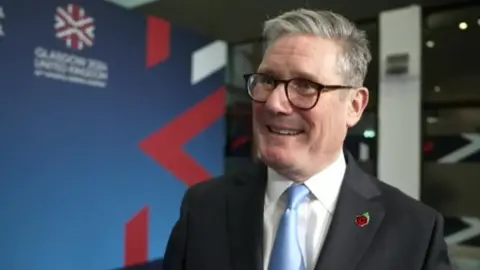
Tributes have also been paid by Julz Davis, a campaigner for racial equality, who said: "Whenever I’m challenged or whenever I’m looking for a piece of wisdom, I will always ask myself the question - what would Paul do?”
He added: "We were so blessed as a city, as a country, that he took on the role that he did.
"He fought for racial and social injustice and those wisdoms, those lessons he leaves we all benefit from today.”
University of the West of England lecturer Roger Griffith told BBC Radio Bristol he would remember Dr Stephenson as a "champion".
He said: "[His] story was was missing from the page of our school books. We now need to take that baton forward and really campaign for racial equality and social justice”
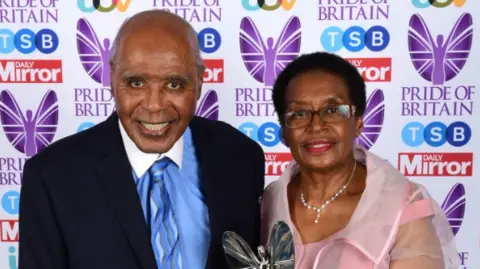 PA
PAWho was Dr Paul Stephenson?
The son of an African father and white British mother, he arrived in Bristol in 1962.
He organised a boycott of the Bristol Omnibus Company, after which its policy of discrimination was ended.
Dr Stephenson was instrumental in paving the way for the first Race Relations Act in 1965.
In 1992, he also helped set up the Bristol Black Archives Partnership, which protects and promotes the history of African-Caribbean people in the city.
He was made an OBE in 2009 for his services to equal opportunities and to community relations.
'We are not taking racism sufficiently seriously'
University of the West of England Professor Shaun Sobers said Dr Stephenson was an "incredible man".
The professor called for the Bristol Bus Boycott to be in "every curriculum without any excuses".
“This is a really important part of British history and it really needs to be told much more widely," he added.
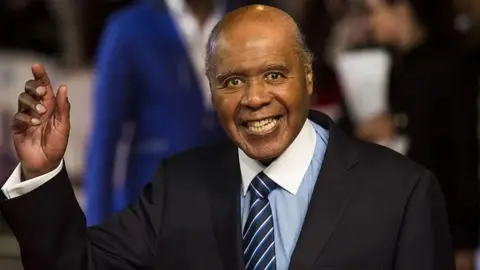 Getty Images
Getty ImagesHe called himself a disruptor; for decades he was a thorn in the establishment’s side.
Yet in his latter years he was feted by the political establishment.
The bus boycott and his sit-in at a Bristol pub a year later brought him to the attention of senior Labour figures including Harold Wilson.
It was not just the law that changed; public attitudes also began to shift, according to writer and historian Edson Burton.
He said: “By being able to put that stake in the ground. Our social attitudes have fallen in behind.
“No longer is it legal but also now it’s not part of British values and part of our legal framework to discriminate.”
Paul Stephenson did not stop there. In the 1970’s and 80’s he worked for the Commission for Racial Equality and campaigned against sporting contacts with apartheid South Africa.
Both helped bring about change, as did his quiet determination to keep speaking out – which he continued to do for decades after he returned to Bristol in 1992.
'Pioneering figure'
Retired Olympic and Commonwealth athlete Vernon Samuels, whose father was the first black bus driver in Bristol, said Dr Stephenson's activism "opened the door for my dad".
He added: "These were ordinary people doing extraordinary things to have civil rights."
Writer and historian Dr Edson Burton said Dr Stephenson was a "pioneering figure up and down the country".
“He actually believed that the values we hold should be upheld, that they were things that were worth fighting for and more," he added.
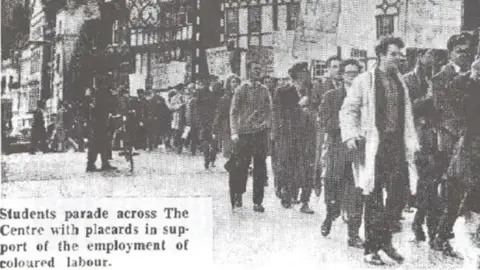 Bristol Evening Post
Bristol Evening PostMore than 60 years have passed since the Bristol Bus Boycott, when campaigners overturned a ban on on ethnic minorities working on Bristol's buses.
It was a milestone in achieving equality and Dr Paul Stephenson was at the heart of the revolution.
It began at the Bristol Omnibus Company, when a young man walked up to reception for a job interview in the spring of 1963.
Eighteen-year-old Guy Bailey was well qualified for the post, but he would not be taken on because he was black. The bus company's general manager Ian Patey turned him away.
Bailey's unsuccessful interview marked a turning point. Members of the local black community, supported by many of their white neighbours, led a boycott of the network in protest.
On 28 August 1963, the same day that 250,000 people marched on Washington DC to demand civil rights for African-Americans, Mr Patey declared a change in policy at the Bristol Omnibus Company.
There would now be "complete integration" on the buses, "without regard to race, colour or creed", Patey added.
Follow BBC Bristol on Facebook, X and Instagram. Send your story ideas to us on email or via WhatsApp on 0800 313 4630.
